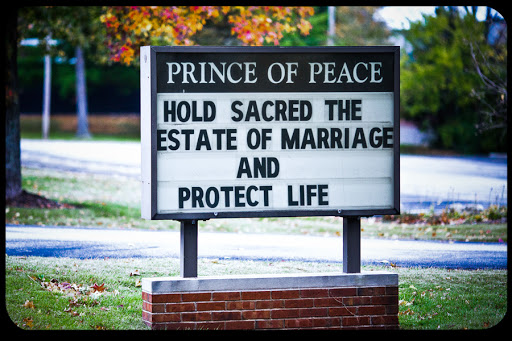The United Methodist Church, with 7.4 million members in the United States, is America’s third largest church, despite having lost over 3.5 million members over the last 50 years. But now its debates over same sex marriage are threatening to fracture the denomination.
United Methodism is the largest of the historically liberal “mainline” Protestant denominations and almost the only one that has not surrendered traditional Christian teaching on sexual behavior. It officially defines marriage as the union of one man and one woman, prohibits celebration of same-sex rites, and ordains only persons who are monogamous in natural marriage or celibate if single.
There’s one major reason United Methodists have not liberalized sexually like the Evangelical Lutheran Church in America, the Presbyterian Church (USA), the Episcopal Church, the United Church of Christ, and the Christian Church (Disciples of Christ). Its membership is global, and on top of the 7.4 million (as of 2012) members in the U.S., it has over 4.5 million members overseas, mostly in Africa, where there are more than 4 million United Methodists. Even as the U.S. church loses nearly 100,000 members annually, the African church gains over 200,000 annually, in places like Nigeria, the Democratic Republic of the Congo (DRC) and Angola. The DRC alone has more than 2 million United Methodists, and there may be more Methodists in church on a typical Sunday in the DRC, where attendance exceeds membership, than in the U.S., where the opposite is true.
United Methodist liberals in the U.S. long assumed their denomination would follow the other liberal mainline denominations. They are exasperated that the growing African church now blocks their agenda. United Methodism’s last governing General Conference, which makes the church’s laws, met in 2012 and voted by 61 percent to reaffirm the church’s teaching that homosexual practice is “incompatible” with Christian teaching. About half of that total came from African delegates.
So some mdisgruntled United Methodist liberal clergy have launched a disobedience campaign to conduct same-sex rites in defiance of church law. This year, a Pennsylvania pastor, in a church trial by his peers, was defrocked for conducting a wedding for his son and another man. Elsewhere, in more liberal jurisdictions, enforcement has been less vigorous. An 80 year old retired Yale Divinity School dean was not prosecuted by the bishop in New York for conducting a wedding of his son to another man.
Many conservative United Methodist clergy are disturbed by the absence of full enforcement of church law, and a group of 80 U.S. clergy recently suggested the denomination should seek an amicable formal division, with conservatives creating their own new denomination, and liberals left to their own church.
“Are we not at a point where we can acknowledge, after years of dialogue and debate, the depth of our differences and together, progressives and traditionalists, give each other the freedom to pursue our understanding of God’s will,” the conservative clergy statement asked. “Can we not learn from the pain that other mainline denominations have experienced and find a way forward that honors [John] Wesley’s rule that we do no harm? A way where there are no winners and losers, but simply brothers and sisters who part ways amicably, able to wish each other well?”
United Methodism has been formally debating homosexuality since 1972, when it first instituted its official teaching specifically against homosexual behavior. These clergy hope for a relatively painless separation that would end the animosity, which includes defiance of church law and acrimonious debates at church conventions, often featuring civil disobedience by defeated liberals. The clergy group offered no details on the logistics of such a division.
The logistics are nearly insurmountable. Two thirds of the General Conference delegates, who next meet in 2016, would have to approve a division, and that vote would need to be ratified by two thirds of the voting members of local annual conferences (similar to dioceses), around the world. A subsequent General Conference would then have to implement. Reaching such a level of consensus on such a controversial issue is very unusual in United Methodism. So far, almost no moderates or liberals have endorsed the idea, which would compare to the formal division between northern and southern U.S. Methodism over slavery before the Civil War.
Instead, a group of liberal clergy, in their own manifesto, have suggested a local option for sex issues. Each annual conference, which often follows state lines in the U.S., could decide for itself whether to ordain persons who are homosexually active. Local churches would decide whether to receive homosexual clergy or host same sex rites. Such a congregationalist arrangement would be alien to Methodism’s traditionally connectional ecclesiology. And most liberals still could not be happy until the whole church fully embraced their view that sex should not be limited to natural marriage.
This proposal from some liberals probably would not require the high hurdle of a two thirds vote but is still very unlikely to gain passage at the General Conference, where Africans and evangelicals now comprise a near majority. Such a local option resembles the initial liberalizing steps of other mainline Protestant denominations, which led to a conservative exodus and creation of new denominations by traditional Anglicans, Presbyterians and Lutherans.
So for the foreseeable future conservative and liberal United Methodists are stuck together unhappily in the same denomination, with little that unites them except property and pensions. But under current membership trends, as the liberal parts of the U.S. church shrink and African churches grow, the Africans are set to become a majority of the United Methodist Church in ten years or less. How U.S. liberals will function in a church where conservative Africans have the power will be fascinating to watch.
Mark Tooley, President of the Institute on Religion & Democracy, is the author of Taking Back the United Methodist Church and Methodism And Politics in the Twentieth Century.

